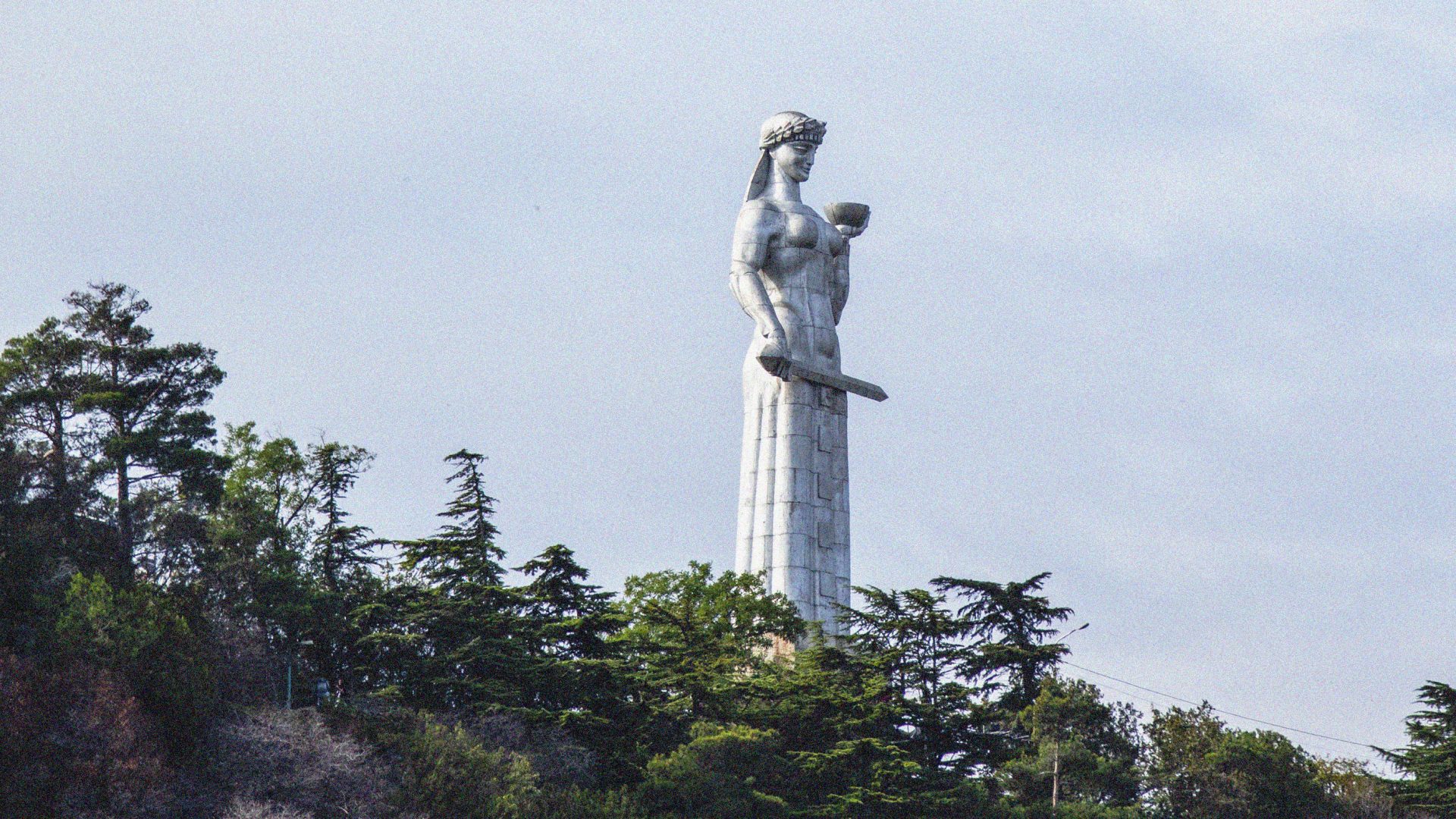The Mother of Georgia towers over Tbilisi. The twenty-metre high aluminium monument, known to locals as Kartlis Deda, holds a sword in one hand and a bowl of wine in another, as if to say: enter Georgia as an enemy and meet the sword; enter as a friend and be welcomed with open arms – and ample wine.
Wine is a defining symbol of Georgian identity. According to one legend, when God divided the Earth, the Georgians arrived flush-faced late from a supra, a traditional Georgian feast. Impressed by their devotion to toasting, God rewarded them with a land of exceptional beauty. “Wine was given to us so we could taste heaven,” Ani, a local guide, told me last autumn, as we trundled around the Alaverdi Monastery in the Kakheti wine region.
Ani explained that winemaking, an 8,000-year-old tradition, is considered both a divine gift and an act of defiance. The 6th-century Alaverdi Monastery is a testament to this, its weathered frescoes bearing the pockmarks of neglect. Russians whitewashed the monastery’s interior in the 19th century, and after the Red Army’s invasion and annexation of Georgia in 1921, wine production was industrialised, erasing wide indigenous grape varieties and replacing their traditional method of making wine in huge earthenware vats, called qvevri, with industrial practices. Yet, the monks continued quietly, passing down their craft through generations. Georgia is now home to more than 500 grape varieties, roughly one-sixth of the world’s total.
“I don’t know how we’ve survived so many invasions and endured as much as we have,” Ani later confessed. “But one thing is for certain: we have rebellion ingrained within.”
I’ve been thinking a lot about the conversation I had with Ani recently. It took place only a few days before Georgian Dream, the pro-Russian political party led by billionaire Bidzina Ivanishvilli, claimed victory in the October 26th election, derailing Georgia’s progress towards European Union membership. Opposition parties rejected the results, citing fraud and voter intimidation. Ani’s words rang ever truer as riot police used tear gas, water cannons and rubber bullets against largely peaceful protesters who continued to rebel.
“It’s 1984 in the making,” my friend Guga tells me. Despite recent headlines romanticising the affordability of food and £2 wine in Georgia, he describes a darker reality: protester intimidation, media crackdowns, and new laws suppressing the opposition. “They all say normalising relations with Russia is the way to go.”
I was in Georgia in October to visit the Tsinandali Estate in the Kakheti region, the cradle of Georgian classical winemaking. Autumn had turned the trees of Tsinandali chestnut brown and fiery red, their rolling vineyards backdropped with the snow-capped eastern Caucasus Mountains. It was at this enchanting place that Prince Alexander Chavchavadze, considered ‘the father’ of Georgian Romanticism, first bottled wine in 1814, blending European techniques with Georgia’s ancient methods.
In the estate’s cellar, I tasted wines fermented in vats that had been buried underground in qvevri, to give them their characteristic depth and colour, such as the red Saperavi and pale-straw-coloured Rkatsiteli white wine. Unesco now recognises this technique as a cultural practice of global significance.
That evening we sat and drank. “Gaumarjos!” (cheers) the guests bellowed in unison over a banquet of khinkali, spiced meat dumplings, salty cheese, fresh vegetables, and shotis puri bread, blistered from baking in a clay oven.
When I asked the table about the election, the tone shifted. “The pro-European opposition is useless,” an elderly man said, but he didn’t trust the Georgia Dream Party either, saying that they were “stupid, but practical”. A young woman said, “we don’t want to become the next Ukraine”.
Georgia’s winemaking industry has persevered through the tumult. In 2024, they exported nearly 95 million litres of wine, and exports hit $565 million – 24% up on the previous year. But some winemakers I met in Sighnaghi were worried. They need stability, and Russia is still the largest export market for their wine. To them, the Georgia Dream Party, for all its corruption and pro-Russian leanings, is a necessary evil.
But that was back in the Autumn. I wonder whether, after six months of civic unrest, they still feel the same.



